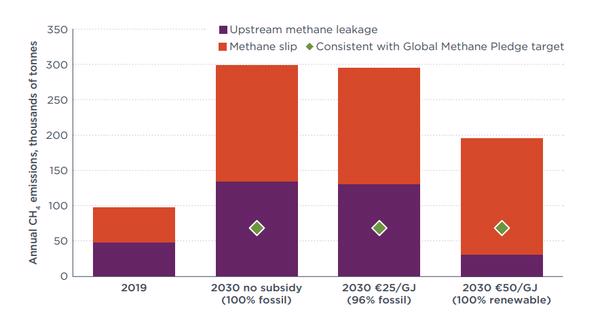Renewable LNG needs a rethink to deal with methane slip - ICCT
A new study from the US non-profit International Council on Clean Transportation (ICCT) notes that the use of renewable LNG might not reduce greenhouse gas (GHG) emissions compared to current levels. The primary reason is methane slip from marine engines.
 CHART: Different forecasts of upstream methane leakages and methane slip, depending on how much renewable energy is used. ICCT
CHART: Different forecasts of upstream methane leakages and methane slip, depending on how much renewable energy is used. ICCT
According to the ICCT report, methane slip from marine engines needs to be virtually eliminated for renewable LNG to contribute significantly towards curbing climate change. Methane leaks upstream must be greatly reduced, while methane leaks from fuel tanks and cargo tanks should be almost zero.
Methane as a global warmer
LNG contains 85-95% and is often considered the cleanest-burning fossil fuel because of its carbon factor of 2.76, meaning each metric tonne of LNG emits 2.76 metric tons of carbon dioxide.
However, the challenge with LNG lies in the occurrence of "methane slip": unburned fuel emitted from internal combustion engines on ships, as well as methane leakages throughout the LNG supply chain.
Although methane slip accounts for only a small percentage of a ship's fuel consumption, it can generate significant GHG emissions in operations that use a large amount of energy.
The Intergovernmental Panel on Climate Change (IPCC) states that methane has 86 times the climate impact of CO2 over a 20-year period. Methane emissions from global shipping increased by more than 150% from 2012 to 2018.

PHOTO: Estimated demand growth for marine LNG fuel in 2019 and 2030. ICCT
As per ICCT estimates, LNG demand will triple between 2019 and 2030. Because of upstream and downstream methane leakages, absolute methane emissions would double from 2019 to 2030.
Dr. Bryan Comer, lead author of the ICCT report and marine programme lead, says that regulations like FuelEU Maritime could be strengthened to discourage use of high-methane-slip engines.
Reconsider renewable LNG
Other fuels such as synthetic diesel and green methanol offer low life-cycle emissions without methane, according to the report. It argues that future work should focus on potential demand for, and supply of, non-methane fuels to support the transition to zero-emission vessels.
Meanwhile, a global coalition of top industry firms like oil major Shell and Mediterranean Shipping Company (MSC), has launched an initiative to manage methane emissions from LNG-fuelled vessels.
The coalition also includes US-based Carnival Cruise Line, Hong Kong-based containership management firm Seaspan, classification society Lloyd's Register, Norwegian firm Knutsen and Maran Gas Maritime, an LNG shipping unit of the Greek Angelicoussis Shipping Group.
Through the Methane Abatement in Maritime (MAM) programme, these firms say they aim to reduce the environmental impact of LNG in shipping.
They will identify and pilot new technologies to monitor and reduce methane slip from LNG-fuelled vessels. After securing validation for these technologies, they will endorse them to the industry next year.
By Konica Bhatt
Please get in touch with comments or additional info to news@engine.online





